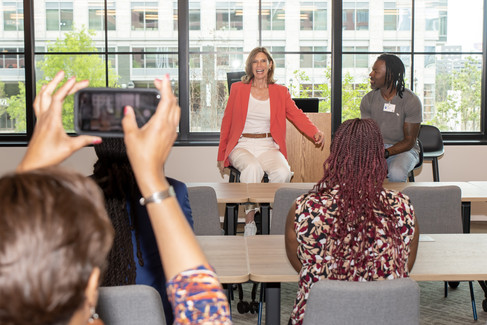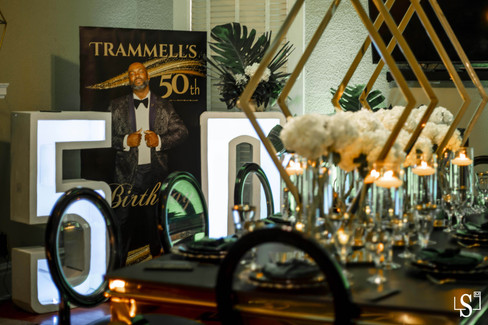
Event Photography is much more nuanced than it appears at first sight. I mean, all the photographer does is walk around and ask people to take photos right? Wrong! An experienced event photographer is constantly surveying, calculating and anticipating throughout the entirety of an event.
Photos of Solidarity Sandy Springs Ribbon Cutting taken by Lance Long of LongShots Media LLC
It's a challenging but rewarding opportunity when you are booked to cover an event. If you are currently an event photographer or someone looking to get into the profession, this post may peak your interest. Keep scrolling as I will walk you thru my approach and execution when covering a major event.

Planning as an Experienced Event Photographer
As soon as I am booked to cover an event, I immediately create a shot list. A shot list is simply a list of required shots to capture during the event. These shots normally consist of portraits, candid photos and/or group shots that are requested by the client.
Photos of Atlanta Commercial Board of Realtors at Microsoft in Atlanta taken by Lance Long of LongShots Media
Once the shot list is created, I scout the location the best I can. Some locations do not allow you to visit prior to shoot date and others are more open. If I can not get to a location, I google it and parse thru google images to get an idea of what the lighting and space will be like on shoot day.
It does not happen often, but sometimes there are no photos of the location available. This makes equipment planning tough but I always have the shot list to at least know what type of shots I need to take.

Prepping and testing equipment (preferably 48hrs in advance) is a requirement if you expect to have a successful shoot. Events are long and provide numerous backgrounds and lighting situations that can become overwhelming while shooting. Constantly messing around with your equipment and troubleshooting errors will definitely cause you to miss key moments.

Client's don't understand your camera better than you so they wont understand why you did not photograph Grandma and Grandpa's speech because your camera malfunctioned. You are the professional who they paid, you must honor that.

Photographing the Event
I always arrive 45-mins early to every shoot if possible. This allows enough time to do a quick scout of the location. Making sure my equipment is operating correctly under the current conditions available limits the amount of potential issues that may arise during the event.
Photos 50th Birthday Party Event Taken by Lance Long of LongShots Media LLC
About 15 mins before the event starts, the decorations and overall design is normally complete. This is the best time to capture my detail and location shots. The venue is usually empty except for a people so your detail shots and quick staging will not be a bother to anyone.

Once the event attendees begin to enter the venue, I try to accomplish two things, capture candid photos and observe relationships. Capturing candid photos at this moment is smart because people do not want to be bombarded once they enter a venue. Keeping my distance and capturing candid shots allows me to stay professional and observe natural interactions between attendees.

Observing how attendees greet other can give the experienced photographer a ton of useful information. Long-time friends, couples and relatives all greet each other differently and therefore should be posing differently when capturing portraits. I use this information throughout the event to ensure I capture all the shots on my list as well as capture photos that are truly valuable to the client.
Various Event Photos Taken by Lance Long of LongShots Media LLC
For the rest of the event, I tend to stay back and pick my moments to shoot. My overall goal is to complete my shot list, not be apart of the event. Planning well allows me to enjoy the event. Socializing with event attendees and forging new positive relationships is a perk of the job that I enjoy. Photography is fun when you are well prepared and experienced with your equipment, but it can quickly turn into a nightmare if you are not.

Editing Event Photos Start during Pre Production
For most people who are not photographers, the most editing they do is when they add filters to their images before posting to social media. Even the most avid photography enthusiast believes that editing starts when you begin transferring image files to a laptop/desktop. Only Experienced Pro Photographers know that Editing truly starts BEFORE shooting begins.

Knowing my location and equipment limitations helps me decipher what my editing needs will be. Planning for a bright outdoor event or lowly lit indoor event will requires different equipment needs that I may or may not have access to. Planning for different scenarios allows me to foresee potential editing needs in post -production.

Once the event is complete, I pack my equipment up, do an inventory check and head back to the office. The first thing I do when I get back to the office is begin to transfer the image files to a hard-drive. While I wait for the files to transfer, I unpack my equipment and charge up my batteries for the next shoot. This is an important step. You always want your camera equipment charged up and ready for the next shoot.

When the files are transferred, I back the files up in the cloud. I never want to lose photos, so I always double back-up the photos to ensure this never happens. Normally, I do not edit right after a shoot. It's too soon and my brain is usually fried from all the calculating during the event. So this is when I sit back and relax. Letting my mind refresh and reset is necessary to be able to edit correctly. I will not go deep into editing in this post.
Conclusion
This is how I approach and execute an event as a photographer. Making sure to Plan accordingly, Shoot effectively and edit with a clear mind has allowed me to successfully complete hundreds of events. Try using one of the tips offered in this article and I guarantee it will help you immensely at your next event.
Looking to begin a career in Photography, Check out this Article I wrote on "3 Books that will help you improve your photography"

































Comments